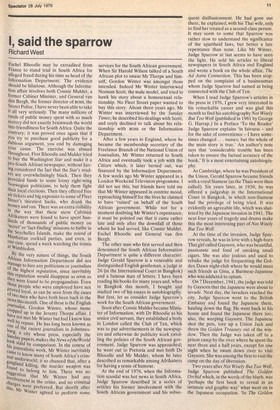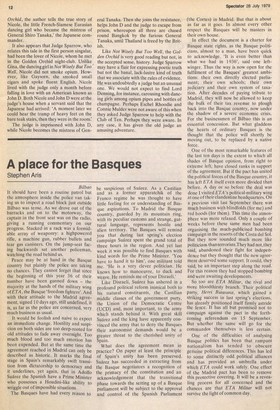I, said the sparrow
Richard West
Eschel Rhoodie may be extradited from France to stand trial in South Africa for alleged fraud during his time as head of the Information Department. The evidence should be hilarious. Although the Information affair involves both Connie Mulder, a former Cabinet Minister, and General van den Bergh, the former director of BOSS, the Secret Police, I have never been able to take It all very seriously. The many millions of rands of public money spent with so much secrecy did not exactly brainwash the world into friendliness for South Africa. Quite the contrary; it was proved once again that if You try to purchase good publicity for a dubious argument, you end by damaging Your cause. The exercise was absurd throughout, First Rhoodie and Mulder tried to buy the Washington Star and make it a Pro-South African newspaper, without having considered the fact that the Star's readers are overwhelmingly black. Then they Provided funds to some loony right-wing Norwegian politicians, to help them fight their local elections. Then they offered free air tickets and big expenses to some of Fleet Street's thirstiest hacks, who drank the money and ran. There was an extra risibility in the way that these stern Calvinist Afrikaners were found to have spent hundreds of thousands of public money on 'secret' or 'fact-finding' missions to bathe in the Seychelles Islands, make the round of Manhattan cocktail parties, and even, in One case, spend a week watching the tennis at Wimbledon.
BY the very nature of things, the South African Information Department did not manage to hire any politicians or journalists of the highest reputation, since inevitably this reputation would disappear as soon as ti.fteY were found to be propagandists. Even tunse people who were employed have not Prmed loyal, as can be seen from the cases °f Iwo men who have both been back in the news this month. One of these is the English Journalist, Gordon Winter, whose name rcroPPed up in the Jeremy Thorpe affair. nave not met Mr Winter but feel I know him °well by repute. He has long been known as bur of the raciest journalists in Johannes!& a city whose press, especially the ,8:0x n day papers, makes the News ofthe World look papers by comparison. In the course of ,r.ns journalistic work, Mr Winter inevitably e to know many of South Africa's crim &I aa underworld; it so chanced that, after a I ongland killing, the murder weapon was suund to belong to him. There was no i„..ggestion that Mr Winter had any Char r°I gesvement in the crime, and no criminal this were preferred. But shortly after , Mr Winter agteed to perform some services for the South African government. When Sir Harold Wilson talked of a South African plot to smear Mr Thorpe and himself, Gordon Winter was amongst those intended. Indeed Mr Winter interviewed Norman Scott, the male model, and tried to hawk his story about a homosexual relationship. No Fleet Street paper wanted to buy this story. About three years ago, Mr Winter was interviewed by the Sunday Times; he described his dealings with Scott, and coyly declined to talk about his relationship with BOSS or the Information Department.
After a few years in England, where he became the membership secretary of the Freelance Branch of the National Union of Journalists, Mr Winter returned to South Africa and eventually took a job with the Citizen which, it later turned out, was financed by the Information Department. A few weeks ago Mr Winter appeared in a London Weekend Television programme. I did not see this, but friends have told me that Mr Winter appeared in contrite mood, reproaching himself for the lives he claimed to have 'ruined' on behalf of the South African government. While not for a moment doubting Mr Winter's repentance, it must be pointed out that it came rather late and only after the downfall of those whom he had served, like Connie Mulder, Eschel Rhoodie and General van den Bergh.
The other man who first served and then denounced the South African Information Department is quite a different character. Judge Gerald Sparrow is a venerable and distinguished English gentleman, a judge at 26 (in the International Court in Bangkok) and a famous man of letters. I have been reading his books for many years and, when in Bangkok this month, I bought and studied two of his essays in autobiograpgy. But first, let us consider Judge Sparrow's work for the South African government.
Soon after Connie Mulder became Minister of Information, with Dr Rhoodie as his senior civil servant, they established a body in London called the Club of Ten, which was to put advertisements in the newspapers and otherwise do publicity work extolling the policies of the South African government. Judge Sparrow was approached; he went out to Pretoria and met both Dr Rhoodie and Mr Mulder, whom he later described as remarkable among Afrikaners for having a sense of humour.
At the end of 1976, when the Information scandal was hot news in South Africa, Judge Sparrow described in a series of articles his former involvement with the South African government and his subse quent disillusionment. He had gone out there, he explained, with his Thai wife, only to find her treated as a second-class person. It may seem to some that Sparrow was rather slow to understand the significance of the apartheid laws, but better a late repentance than none. Like Mr Winter, Judge Sparrow at last seems to have seen the light. He sold his articles to liberal newspapers in South Africa and England and wrote a book on the whole affair, The Ad Astra Connection. This has been stopped on the complaint of a businessman whom Judge Sparrow had named as being connected with the Club of Ten.
When I read Judge Sparrow's articles in the press in 1976, I grew very interested in his remarkable career and was glad this month to find his autobiography Not Wisely But Too Well (published in 1961 by George G. Harrap.) In a Preface `To the Reader' Judge Sparrow explains 'in fairness — and for the sake of convenience — I have sometimes changed . . names; but the whole of the main story is true.' An author's note says that 'considerable trouble has been taken to ensure the factual accuracy of the book.' It is a most entertaining autobiography.
At Cambridge, where he was President of the Union, Gerald Sparrow became friends with a royal Siamese (as the Thais were then called). Six years later, in 1930, he was offered a judgeship in the International Court in Bangkok, in which non-Siamese had the privilege of being tried. It was evidently an agreeable life, which was shattered by the Japanese invasion in 1941. The next four years of tragedy and drama make this the most interesting part of Not Wisely But Too Well.
At the time of the invasion, Judge Sparrow reveals, he was in love with a high-born Thai girl called Gaysorn, who was beautiful, passionate and fond of smoking small cigars. She was also jealous and used to rebuke the judge for frequenting the Golden Dawn night-club where he would meet such friends as Gina, a Burmese-Japanese who was addicted to opium.
On 7 December, 1941, the judge was told by Gaysorn that the Japanese were about to invade. Next day, the invaders reached the city. Judge Sparrow went to the British Embassy and found the Japanese there, hauling down the flag. He went back to his house and found the Japanese there too; also, the weeping Gaysorn. The Japanese shot the pets, tore up a Union Jack and threw the Golden Treasury out of the window. Then the Judge was taken off to a prison camp by the river where he spent the next three and a half years, except for one night when he swam down river to visit Gaysorn. She was among the first to visit the camp on the day of liberation.
Two years after Not Wisely But Too Well, Judge Sparrow published The Golden Orchid which, in the words of the blurb, was 'perhaps the first book to reveal in an intimate and graphic way' what went on in the Japanese occupation. 'In The Golden Orchid, the author tells the true story of Nicole, the little French-Siamese Eurasian dancing girl who became the mistress of General Shiro Tanaka,' the Japanese commander.
It also appears that Judge Sparrow, who relates this tale in the first person singular, had been the lover of Nicole, whom he met in the Golden Orchid night-club. Unlike Gina, the dancing girl in Not Wisely But Too Well, Nicole did not smoke opium. However, like Gaysorn, she smoked small cigars and spoke fluent English. Nicole lived with the judge only a month before falling in love with an American known as John D. Both Nicole and John D were at the judge's house when a servant said that the Japanese had arrived: 'A moment later we could hear the tramp of heavy feet on the bare teak stairs, then they were in the room: The judge is imprisoned with John D, while Nicole becomes the mistress of Gen eral Tanaka. Then she joins the resistance, helps John D and the judge to escape from prison, whereupon all three are chased round Bangkok by the furious General Tanaka, until Thailand is freed by the British.
Like Not Wisely But Too Well, the Golden Orchid is very good reading but not, in the accepted sense, history. Judge Sparrow may have a flair for expressing poetic truth but not the banal, lack-lustre kind of truth that we associate with the rules of evidence. He was undoubtedly a judge but an unusual one. We would not expect to find Lord Denning, for instance, carousing with dancing girls among opium pipes and bottles of champagne. Perhaps Eschel Rhoodie and Connie Mulder were not aware of this when they asked Judge Sparrow to help with the Club of Ten. Perhaps they were aware. In any case, it has given the old judge an amusing adventure.







































 Previous page
Previous page